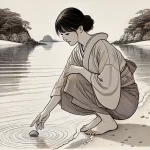上を向いて歩こう [Ue o Muite Arukō]
坂本九 [SAKAMOTO Kyū]
Words : 永六輔 [EI Rokusuke]
Music : 中村八大 [NAKAMURA Hachidai]
“Ue o Muite Aruko (Sukiyaki)” is a song by Kyu Sakamoto released in 1961. It became a big hit in Japan and is a beloved classic that has been featured in music textbooks numerous times.
The following year, this song was introduced in Europe under the name “Sukiyaki” and became a massive hit. It topped charts around the world and reached number one on the Billboard Hot 100 in 1963. Until the Korean dance group BTS appeared in 2020, it was the only song by an Asian artist to reach number one on the Hot 100.
Sukiyaki might have been considered a representative Japanese dish by Westerners at the time, but the lyrics have nothing to do with it. So what exactly does this song sing about? It’s a very straightforward song, so I encourage you to read the lyrics.
上を向いて歩こう
ue o muite arukō
涙がこぼれないように
namida ga koborenai yō ni
- 上(うえ) [ue] : up
- 向く(むく) [muku] : face, look
- 歩く(あるく) [aruku] : walk
- 涙(なみだ) [namida] : tears
- こぼれる(こぼれる) [koboreru] : spill
(translation) “I look up as I walk
So the tears won’t fall.”
This theory is simple to understand. If you look up, the tears won’t fall. There was a boy who actually did this to hide his tears when I was a child.

Japanese people might be easily moved to tears, but there is also a virtue in not showing tears.
思い出す春の日
omoidasu haru no hi
一人ぽっちの夜
hitoripocchi no yoru
- 思い出す(おもいだす) [omoidasu] : recall
- 春(はる) [haru] : spring
- 日(ひ) [hi] : day
- 一人(ひとり) [hitori] : alone
- ひとりぼっち [hitoribocchi] : lonely
- 夜(よる) [yoru] : night
(translation) “Remembering the spring days
And the lonely nights.”
The word “一人ぽっち / hitori pocchi” is slightly interesting. The correct Japanese word found in dictionaries is “一人ぼっち / hitori bocchi.” Perhaps the author, EI Rokusuke, chose “pocchi” because it conveys a sense of loneliness.
In Japanese, there is a priority on conveying a sensory experience. What do you think about the difference between “bocchi” and “pocchi”?
上を向いて歩こう
ue o muite arukō
にじんだ星をかぞえて
nijinda hoshi o kazoete
- にじむ(にじむ) [nijimu] : blur
- 星(ほし) [hoshi] : stars
- 数える(かぞえる) [kazoeru] : count
(translation) “I look up as I walk
Counting the blurred stars.”
The stars appeared blurred because of the tears.
思い出す夏の日
omoidasu natsu no hi
一人ぽっちの夜
hitoripocchi no yoru
- 夏(なつ) [natsu] : summer
(translation) “Remembering the summer days
And the lonely nights.”
幸せは雲の上に
shiawase wa kumo no ue ni
幸せは空の上に
shiawase wa sora no ue ni
- 幸せ(しあわせ) [shiawase] : happiness
- 雲(くも) [kumo] : cloud
- 空(そら) [sora] : sky
(translation) “Happiness is above the clouds
Happiness is above the sky.”
上を向いて歩こう
ue o muite arukō
涙がこぼれないように
namida ga koborenai yō ni
泣きながら歩く
nakinagara aruku
一人ぽっちの夜
hitoripocchi no yoru
- 泣く(なく) [naku] : cry
(translation) “I look up as I walk
So the tears won’t fall
Though I cry as I walk
For the lonely night.”
思い出す秋の日
omoidasu aki no hi
一人ぽっちの夜
hitoripocchi no yoru
- 秋(あき) [aki] : autumn
(translation) “Remembering the autumn days
And the lonely nights.”
悲しみは星のかげに
kanashimi wa hoshi no kage ni
悲しみは月のかげに
kanashimi wa tsuki no kage ni
- 悲しみ(かなしみ) [kanashimi] : sadness
- 星(ほし) [hoshi] : stars
- 影(かげ) [kage] : shadow
- 月(つき) [tsuki] : moon
(translation) “Sadness is in the shadow of the stars
Sadness is in the shadow of the moon.”
上を向いて歩こう
ue o muite arukō
涙がこぼれないように
namida ga koborenai yō ni
泣きながら歩く
nakinagara aruku
一人ぽっちの夜
hitoripocchi no yoru
一人ぽっちの夜
hitoripocchi no yoru
Kyu Sakamoto’s singing style, influenced by rockabilly, was quite unique at the time, and he wasn’t highly regarded in the conservative Japanese music world back then. It is said that he was influenced by Elvis Presley and Buddy Holly.
About the English title “Sukiyaki,” Fred Bronson, a columnist for Newsweek, commented that it was like selling “Moon River” in Japan under the title “Beef Stew.” However, this is just my opinion, but since Sukiyaki is a dish that came about as Japan Westernized after 1868, due to Buddhist influences against meat consumption, it is actually a rather Western-like food. Considering that this song was influenced by America, the title “Sukiyaki” might actually be fitting.

YouTube Search “Ue o Muite Aruko (Sukiyaki) – Kyu Sakamoto”
Next time, I will introduce another famous song of his, “Miagete Goran Yoru no Hoshi o.”
Thanks for reading! Feel free to comment if you have any feedback or questions.
Follow me on X.



